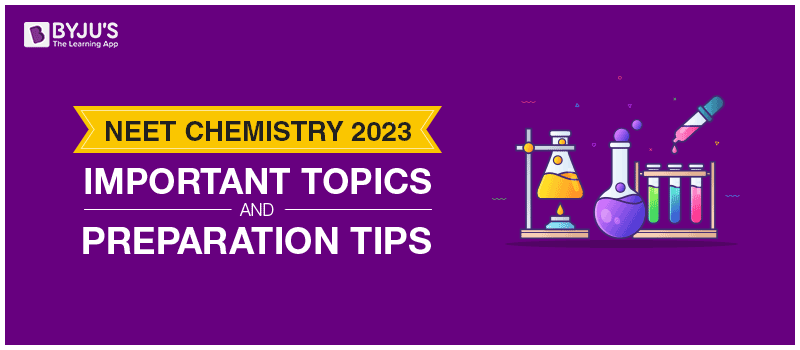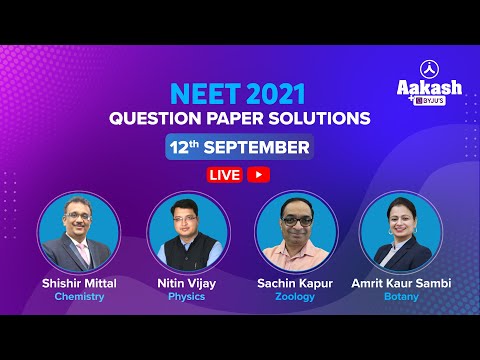Most Important Chapters of NEET Chemistry
Understanding NEET with Chemistry syllabus of NEET
NEET Chemistry is divided into three sections, namely, Physical, Organic and Inorganic Chemistry. Compared to Biology and Physics, Chemistry is considered to be the most scoring section. If prepared thoroughly, chemistry can help students to secure a meritorious position in the exam. Out of a total 720 marks (180 questions), NEET Chemistry comprises 180 marks (45 Questions). Therefore, it is essential for students to prepare well for the Chemistry section.
Helpful link: Prepare with NEET Test series 2023
NEET 2022 Paper Live Discussion with Solutions | NEET 2022 Question paper with Answer Key

Download NEET 2022 Question Paper With Solutions PDF
Nearly 36% of weightage in NEET Chemistry section is allotted to Physical and Inorganic Chemistry while 28% of weightage is allotted to Organic Chemistry Syllabus as per previous trends, in some instances, equal marks-distribution is seen between all three sections. In order to enhance your chemistry preparation, it’s crucial to have thorough planning considering all your strengths, weaknesses and time availability for exam preparation.

Also see: NEET Questions
NEET Chemistry Important Topics
| Important Notes of Chemistry For NEET Alcohols Phenols and Ethers |
Based on the last few years’ question paper analysis, we have figured out the most important topics of Chemistry, from where the questions are generally asked. They are as listed below:
| Organic Chemistry | Inorganic Chemistry | Physical Chemistry |
|---|---|---|
| What is Nuclear Stability | What is Mass Defect | |
| Amines | D Block Elements | Atomic Structure |
| Organic Compounds Containing Oxygen | Classification of Elements & Periodicity | Mole Concept & Stoichiometry |
| Environmental Chemistry | Chemical Bonding and Molecular Structure | Redox Reactions & Electrochemistry |
| Basic Principles of Organic Chemistry | Coordination Compounds | Thermochemistry & Thermodynamics |
| Biomolecules | P Block Elements | Equilibrium |
| Hydrocarbons and their substituents | Practical Chemistry | Surface Chemistry |
| Polymers | Hydrogen and S Block Elements | Nuclear Chemistry & Chemical Kinetics |
| F Block Elements | States of Matter & Solutions |
Which chapter is most important for NEET Chemistry?
The chemistry section of NEET is considered to be the scoring section. The questions are NCERT-based predominantly. While all chapters of the NEET Chemistry syllabus must be thoroughly read and understood to excel at NEET, there are some chapters in the syllabus that are most important and must be prioritized. As per previous years’ trends, questions from the following chapters are said to have appeared the most. These numbers are subject to change every year. Take a look at the most important chapters of NEET Chemistry so far –
- Equilibrium
- p-block elements
- Hydrocarbons
- D and f block elements
- Coordination compounds
- Chemical bonding & molecular structure
- Electrochemistry
- Solutions
- Organic chemistry – Some basic principles and techniques
- Aldehydes, ketones and carboxylic acids
In addition, to the above-mentioned chapters, candidates are also required to thoroughly learn and comprehend other chapters covered in the NEET Syllabus to be able to answer any question asked in NEET.
Recommended Video:
Complete 2 Years Plan For NEET 2024 Chemistry Preparation

Also Check: Chemistry MCQs for NEET
NEET Concepts – NEET Chemistry Important Topics and Preparation Tips
NEET Physical Chemistry – NEET Chemistry Important Topics and Preparation Tips
It’s the numerical section of the NEET Chemistry paper. Understanding the concepts is crucial for Physical Chemistry. It’s difficult to interpret a numerical without understanding the related concepts. Students are advised to have a strong grip on all the concepts taught in NCERT textbooks. Also, maintain a list of important formulas and practice questions regularly. From this section, the probability of getting theory-based questions is quite less. However, with regular practice, you can score good marks in this section.
Organic Chemistry for NEET – NEET Chemistry Important Topics and Preparation Tips
Students are advised to understand and memorize all the equations, formulae, and reactions given in NCERT textbooks. Memorize the names of various compounds that constitute reagents, subtracts, etc. To gain command over this section, practice a variety of questions from reference books as well.
Inorganic Chemistry for NEET – NEET Chemistry Important Topics and Preparation Tips
It is the easiest section of NEET Chemistry. Most of the students complete this section in very little time as numerical and formula-based questions are usually not asked from this section. Students are advised to understand the basic concepts taught in NCERT textbooks thoroughly.
NEET Chemistry Preparation Tips – NEET Chemistry Important Topics and Preparation Tips
Formulate a proper Preparation Strategy: Planning plays a crucial role while preparing for a highly competitive exam like NEET. Instead of having a long-term goal, create small and achievable goals. This will allow you to monitor your progress more clearly. Prepare a weekly study plan and target certain topics each week. Focus on your target and work hard to achieve it within the specified time frame.
Read More: NEET Chemistry Formulas
Refer NCERT Textbooks: Several times the questions asked in the NEET exam are picked directly from the concepts taught in NCERT textbooks. Therefore, the students are advised to cover all the concepts taught in NCERT textbooks before moving to other reference books. The language used to explain concepts in NCERT textbooks is simple and easy to understand. Once you are completely done with NCERT textbooks you can follow the given below reference books to enhance your NEET preparation.
| Name of Book | Author |
|---|---|
| Inorganic Chemistry | J.D. Lee |
| Physical Chemistry | O.P. Tandon |
| Organic Chemistry | M.S. Chouhan |
Practice previous years’ question papers: Solving previous years’ question papers is one of the best ways to prepare for a competitive exam like NEET. It helps to evaluate your preparation level, helps in quick revision of syllabus, makes you familiar with the examination pattern, and improves your speed and time management skills crucial for successfully completing the exam.
The students are advised to incorporate the above-mentioned preparation tips into their routine so that all the topics included in NEET Chemistry syllabus can be covered smoothly. The students can analyse the topic wise marks distribution of different concepts and plan their preparations accordingly.
NEET Chemistry Analaysis
NEET 2021 Weightage – Number Of Questions Asked is as given below –
| Chemistry Sections | Questions Breakup |
|---|---|
| Inorganic Chemistry | 19 |
| Organic Chemistry | 15 |
| Physical Chemistry | 16 |
| Physical Chemistry | |
|---|---|
| Chapter | No. of Questions |
| Solid state | 2 |
| States of matter | 2 |
| Thermodynamics | 1 |
| Electrochemistry | 2 |
| Surface chemistry | 1 |
| Solutions | 2 |
| Chemical Kinetics | 2 |
| Nuclear Chemistry | 1 |
| Mole concept | 1 |
| Atomic structure | 1 |
| Ionic equilibrium | 1 |
| Inorganic Chemistry | |
|---|---|
| Chapter | No. of Questions |
| Chemical Bonding | 5 |
| s-block | 2 |
| p-block | 3 |
| d and f block | 2 |
| Metallurgy | 2 |
| Environmental chemistry | 1 |
| Coordination chemistry | 2 |
| Organic Chemistry | |
|---|---|
| Chapter | No. of Questions |
| Some basic principles and techniques | 1 |
| Hydrocarbons | 4 |
| Haloalkanes and Haloarenes | 2 |
| Alcohol, Phenol and Ether | 1 |
| Carbonyl compound | 3 |
| Amine | 2 |
| Biomolecules | 1 |
| Polymers | 1 |
| Chemistry in Everyday Life | 1 |
NEET Chemistry 2020 – Weightage
In NEET 2020 question paper, there were a total of 9 challenging, 22 moderate, and 14 easy level questions. Overall, the difficulty curve of questions asked in NEET Chemistry was between easy and moderate. A foolproof preparation strategy can help students easily extract maximum marks from this section.
In other words, NEET 2020 chemistry section, fared between easy and moderate on the difficulty scale. Most of the questions appeared from NCERT sources, while organic chemistry was highlighted for its number of questions. In NEET 2021, the section fared between easy to moderate on the difficulty scale. Most questions appeared on the NCERT facts, figures and tables.
The table below shows section-wise weightage (approximate) of all the chapters as per NEET 2020. Take a look:
| Class | Chemistry Section | Name of unit | Weightage (approximate) |
|
Class 11
|
Inorganic Chemistry
|
Hydrogen |
13%
|
| s-Block Element (Alkali and Alkaline earth metals) | |||
| Some p-Block Elements | |||
| Chemical Bonding and Molecular Structure | |||
| Classification of Elements and Periodicity in Properties | |||
|
Organic Chemistry
|
Environmental Chemistry |
11%
|
|
| Organic Chemistry- Some Basic Principles and Techniques | |||
| Hydrocarbons | |||
|
Physical Chemistry
|
Some Basic Concepts of Chemistry |
22%
|
|
| Structure of Atom | |||
| States of Matter: Gases and Liquids | |||
| Thermodynamics | |||
| Equilibrium | |||
| Redox Reactions | |||
|
Class 12
|
Inorganic Chemistry
|
General Principles and Processes of Isolation of Elements |
16%
|
| p- Block Elements | |||
| d and f Block Elements | |||
| Coordination Compounds | |||
|
Organic Chemistry
|
Haloalkanes and Haloarenes |
22%
|
|
| Alcohols, Phenols and Ethers | |||
| Aldehydes, Ketones and Carboxylic Acids | |||
| Organic Compounds Containing Nitrogen | |||
| Biomolecules | |||
| Polymers | |||
| Chemistry in Everyday Life | |||
|
Physical Chemistry
|
Solid State |
16%
|
|
| Solutions | |||
| Electrochemistry | |||
| Chemical Kinetics | |||
| Surface Chemistry |
Important Videos


Stay tuned with us for more information on NEET Chemistry Syllabus, Previous year’s question papers with solutions and answer keys, important questions, study material, and more.
| Recommended Question Papers for NEET Exam |


Frequently Asked Questions on NEET Chemistry
How to study chemistry for NEET
1. NCERT theoretical concepts must be mastered. 2. Solve NCERT exemplar questions and also solve coaching modules 3. Organic chemistry – the process of reactions must be understood, which only helps to learn reactions on the same lines just as easily. Practice consistently 4. Inorganic chemistry – prepare notes for important reactions and practice thoroughly. Refer NCERT for this 5. Physical chemistry – make note of all equations soon after covering a chapter 6. Maintain a separate section in notes for reactions and their working 7. Make key notes and revise regularly 8. Solve previous years’ question papers, sample papers 9. Take up a mock test every day
How to study organic chemistry for NEET
1. Gain a good understanding of concepts rather than adapting rote learning techniques 2. The reactions of organic chemistry must be understood. It only becomes easier once comprehended and then practiced regularly 3. The mechanism of reaction should be understood 4. Solve more and more question papers/sample papers. 5. Mock tests must be taken up on a regular basis 6. A good understanding of physics concepts such as kinetics, equilibrium, electrostatics and thermodynamics, etc. helps to better understand organic chemistry
How to study inorganic chemistry for NEET
1. Read NCERT Inorganic chemistry line by line 2. Inorganic chemistry demands conceptual clarity, hence start from the very first basic chapter and follow the sequence of chapters 3. Understand the chapterwise weightage of topics under inorganic chemistry, prioritize accordingly 4. Prepare notes, use shortcuts, flowcharts, mnemonics, mappings, etc to remember easily and for long 6. Reactions of inorganic chemistry – target 2 reactions every day 5. Revise every day. Solve as many questions possible every day
Do or Die chapters for NEET 2023 chemistry
This is a list of do or die chapters for NEET Chemistry 2023: Chemical bonding, Structure of atom, Equilibrium, Hydrocarbon, Coordination compounds, Thermodynamics, GOC, Electrochemistry, Amine, Name Reaction, Chemical kinetics, Biomolecules, Aldehyde ketone, Polymers, d and f block, p-block (class 12)
Good
Thank u good information
Thank you so much for giving this much useful information about NEET Chemistry
Thank u so much for the information